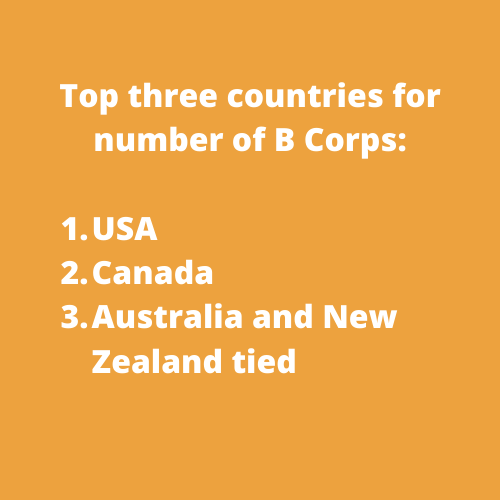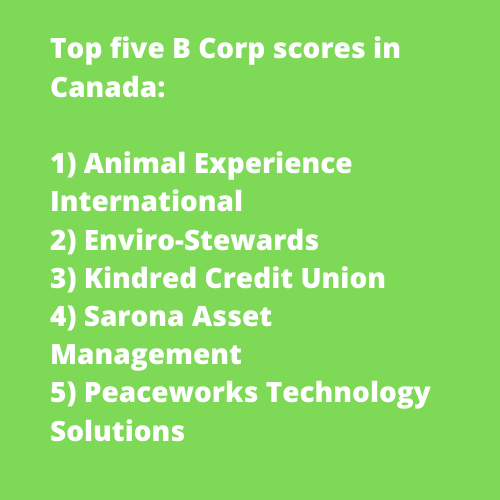Are B Corps the future of Canadian business for good?
Why It Matters
After the United States, Canada has the highest number of B Corps — for-profit companies certified by an independent organization as socially and environmentally responsible — in the world. Is the B Corp movement the future of business for good? As consumers increasingly demand transparency and ethical behaviour from the companies they support, B Corps are a new and impactful group with potential to shake up the entire social impact sector. The first in our member-exclusive series on Canada's B Corp movement.

In 2019 alone, 61 companies became B Corporations — for-profit companies certified by the nonprofit U.S. organization B Lab as successfully balancing social and environmental responsibility with profit. After the United States, Canada has the highest number of these certifications in the world. Canada currently houses 276 B Corporations (B Corps) as of 2020, according to B Lab.
In 2009, FlipGive became the first Canadian company to receive its B Corps distinction. The Toronto-based funding app, which raised $5 million in a series A funding round last year.
B Corporations commit to a double responsibility: serve financial stakeholders as well as non-financial stakeholders, honouring an obligation to create socially responsible practices while churning profit. Nonprofit organizations are not eligible to receive certification.

To become a B Corp, a for-profit company must undergo a B Impact Assessment (BIA), which is created and administered by B Lab and looks at a company’s business model and operations. Companies must receive a score of at least 80, based on the company’s standards in governance (ethics, transparency about business practices) and among its workers (benefits or training, for instance). A company’s efforts within its community, such as job creation, and its impact on the environment are evaluated too, and companies are scored based on their previous 12 months of business. The process of getting the certification can take years to secure, and factors like company size, location are taken into account. Companies must be operational for at least one year before they can be eligible for B Corp certification. There’s also a legal framework that a designated B Corp needs to abide by, promising to account for all its stakeholders when making decisions around things like structural changes and raising capital.
B Corps aren’t limited in growth by the B Corp certification. A company that was among the first pack of Canadian B Corps was Bullfrog Power, which has gone on to be a leader in providing a green energy solution to Canadians. Genuine Health was another early Canadian B Corp, and among the pioneers in the natural supplement space. It sells science-based supplements, and the company merged with Basd Body in 2019 to expand its product line.
Animal Experience International, which provides global volunteering options for animal lovers, holds the highest score (159.6) among B Corps in Canada. Enviro-Stewards (149.1), Kindred Credit Union (144.3), Sarona Asset Management (139.0) and PeaceWorks Technology Solutions (138.0), round up Canada’s leading fleet of five.

However, the Canadian food and beverage sector sees the largest amount of B Corps, according to B Lab. Big names like Danone Canada have made their process of obtaining B Corps certification public, although many B Corps, such as Calgary’s Drizzle Honey (B certified in 2019), are much smaller but still operate with the same intent of doing “better business” through social and environmental impact.
BDC has been another major Canadian corporation to become a B Corp and was the first bank globally to get the certification. B Corps are “tackling major systemic challenges,” says Carla Heim, senior advisor of social entrepreneurship at BDC in a release. “This is a movement of leaders and trailblazers; if you network with them you’re certain to learn a lot.”
Why become a B Corp?
B Lab shared that the data they’ve collected “often tells the story of B Corps being more inclusive, more responsible, more likely to take climate action and more attractive to job seekers.” To be a B Corp, the focus needs to be “more stakeholder-centric than ordinary businesses.”
Businesses may wish to become B Corp certified in order to open new avenues to revenue streams and gain a competitive advantage or connect with like-minded businesses whose purpose and profit to go hand-in-hand — Genuine Health’s merger with with Basd Body is an example.
Businesses may wish to become B Corp certified in order to open new avenues to revenue streams and gain a competitive advantage or connect with like-minded businesses whose purpose and profit to go hand-in-hand.

A B Corp certification can also lead to a more positive brand association among a company’s consumers, because they can view data not otherwise shared on the company’s financial statements, and this can build more trust between company and consumers. Many companies embed the B Corp logo on their website homepages.
Creating a B economy, which B Lab describes as companies coming together to use business for good, could happen sooner than we think — there are B Corps in more than 70 countries. It’s essential for anyone working in social impact to understand who the key players are, what Canada has to offer, and if a B Corp certification is worth it.
Stay tuned for the rest of this member-exclusive series to learn more about this movement in business for good.
